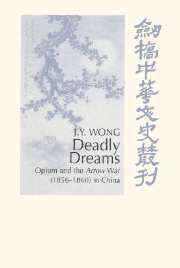Book contents
- Frontmatter
- Contents
- List of Tables
- List of Figures
- Poem by the late Mr Qin Esheng
- Foreword by Professor Wang Gungwu
- Foreword by Professor C. A. Bayly
- Preface
- Part I The confusion of imperialism
- Part II The pretext for imperialism
- Part III The personalities of imperialism
- 3 Harry Parkes: ‘If you would read a little international law.’ – Punch.
- 4 Sir John Bowring: Possessed by a monomania
- 5 Commissioner Yeh: A ‘monster’?
- 6 Rule Britannia and vox populi, vox Dei
- Part IV The rhetoric of imperialism
- Part V The mechanics of imperialism
- Part VI The economics of imperialism
- Part VII The dynamics of imperialism
- Chronology of major events
- Word list
- Abbreviations
- Bibliography
- Index
4 - Sir John Bowring: Possessed by a monomania
Published online by Cambridge University Press: 29 September 2009
- Frontmatter
- Contents
- List of Tables
- List of Figures
- Poem by the late Mr Qin Esheng
- Foreword by Professor Wang Gungwu
- Foreword by Professor C. A. Bayly
- Preface
- Part I The confusion of imperialism
- Part II The pretext for imperialism
- Part III The personalities of imperialism
- 3 Harry Parkes: ‘If you would read a little international law.’ – Punch.
- 4 Sir John Bowring: Possessed by a monomania
- 5 Commissioner Yeh: A ‘monster’?
- 6 Rule Britannia and vox populi, vox Dei
- Part IV The rhetoric of imperialism
- Part V The mechanics of imperialism
- Part VI The economics of imperialism
- Part VII The dynamics of imperialism
- Chronology of major events
- Word list
- Abbreviations
- Bibliography
- Index
Summary
I. Why was Bowring led on by his young consul?
In the preceding chapter we saw how Sir John Bowring was led on by young Consul Parkes until the Arrow incident was transformed into an undeclared war. Hostilities led to the destruction of the foreign factories in Canton, and the British community there withdrew to Hong Kong.
Bowring was full of regret. He was above all apprehensive of the reaction at home. ‘I hope it will be my good fortune to terminate this work of war at Canton as satisfactorily as the work of peace in Siam,’ he warily wrote in private to the foreign secretary, Lord Clarendon, ‘before all I hope for your approval and I do not believe it will be wanting’. To his son he expressed great anxiety about the course his government would take. He even exclaimed, ‘Will they not help us, speedily, effectually in these our great straights [sic]?’ The suspense eventually became so unnerving that he began to doubt whether he would continue to be ‘allowed to manage matters … I always fear the character of the instructions from home’.
Not surprisingly, his relationship with Parkes rapidly deteriorated as he came to blame the consul for his difficulties. He ordered Parkes, now redundant as acting consul at Canton, to resume his duties as consul at Xiamen (Amoy) on the grounds that ‘a long time must elapse before any resumption of trade can take place at Canton’.
- Type
- Chapter
- Information
- Deadly DreamsOpium and the Arrow War (1856–1860) in China, pp. 84 - 108Publisher: Cambridge University PressPrint publication year: 1998



